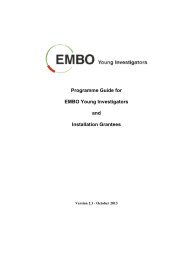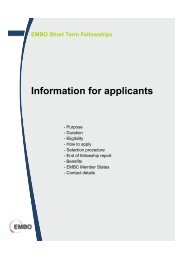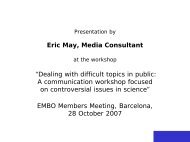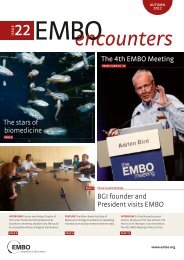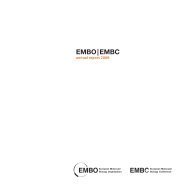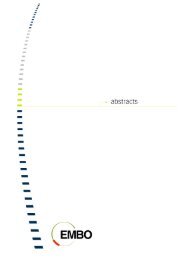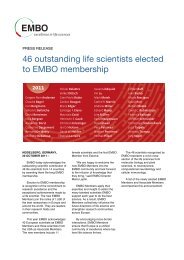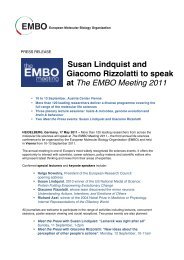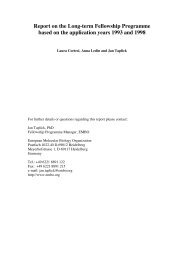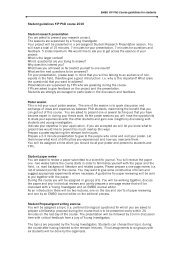EMBO|EMBC
EMBO|EMBC
EMBO|EMBC
You also want an ePaper? Increase the reach of your titles
YUMPU automatically turns print PDFs into web optimized ePapers that Google loves.
➔ 6<br />
preface<br />
Tim Hunt<br />
EMBO Council Chair<br />
Marja Makarow<br />
EMBC President<br />
Christiane Nüsslein-Volhard<br />
EMBO Secretary General<br />
EMBO & EMBC 2006<br />
EMBO stands for excellence: excellent people,<br />
excellent meetings and excellent journals.<br />
Maintaining these standards down the years<br />
takes time, effort and of course money – and<br />
the core programmes of EMBO are fi nanced<br />
by the 25 member states of the European Molecular<br />
Biology Conference (EMBC). It is perhaps<br />
remarkable, but no accident, that EMBO enjoys<br />
the trust of governments all over Europe, who<br />
continue to provide generous sums to support<br />
its molecular biology fellowships, courses and<br />
workshops without regard to questions of ‘juste<br />
retour’. This is a matter of trust and integrity, a<br />
precious reputation that EMBO has built over its<br />
forty-plus years of existence.<br />
One might wonder if molecular biology still<br />
needs such special support, considering its<br />
overwhelming dominance as a way of looking<br />
at the world. Almost nothing in biology can now<br />
be considered without regard to its constituent<br />
molecules. But the model EMBO provides for European<br />
science is something of which to be extremely<br />
proud – to be cherished and preserved<br />
at all costs. We await with great interest, and<br />
some pride, the development of the European<br />
Research Council (ERC), whose foundation was<br />
strongly supported and actively promoted by<br />
EMBO. The ERC will provide grants to research<br />
groups and labs, not only in the life sciences,<br />
but also in physics, chemistry and the humanities.<br />
Thus, the ERC will complement EMBO and<br />
other organisations such as the ESF and ELSO.<br />
www.embo.org | embo@embo.org<br />
A great strength of EMBO has been its<br />
bottom-up approach to the support of science,<br />
which provided a model for the ERC (fi ve of<br />
whose scientifi c council are EMBO Members and<br />
a sixth an EMBO Young Investigator). We fi rmly<br />
believe that scientists know best how to run<br />
science, whereas administrators know how and<br />
where to fi nd money. Wise governments trust<br />
scientists, and it is apt that each delegation of<br />
EMBC includes one scientifi c member and one<br />
representative from research administration,<br />
thereby combining the necessary specialisms.<br />
The ERC is another example where the knowledge<br />
of researchers has been trusted. EMBO together<br />
with other organisations strongly urged<br />
for the bottom-up approach for the ERC in order<br />
to develop the best concepts and practices.<br />
The EU and its Parliament should be praised for<br />
their conception of the ERC and for allowing it<br />
to adopt the best practices concerning strategy,<br />
governance and evaluation procedures.<br />
Back to practical matters. Despite the existence<br />
of a number of alternative sources of postdoctoral<br />
fellowship schemes, such as the EU’s<br />
Marie Curie Fellowships and the international<br />
Human Frontier Science Program, the demand<br />
for EMBO Fellowships continues to increase.<br />
Recent analysis by the EMBO administration<br />
suggests that twice as many fellowships could<br />
be awarded without compromising standards<br />
– somewhere between three and four hundred<br />
a year. It is thus crucial that EMBO Members



